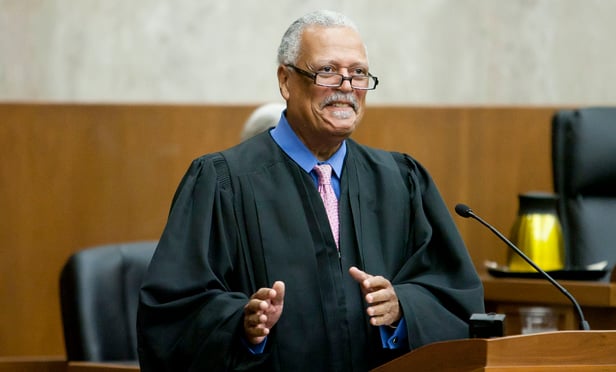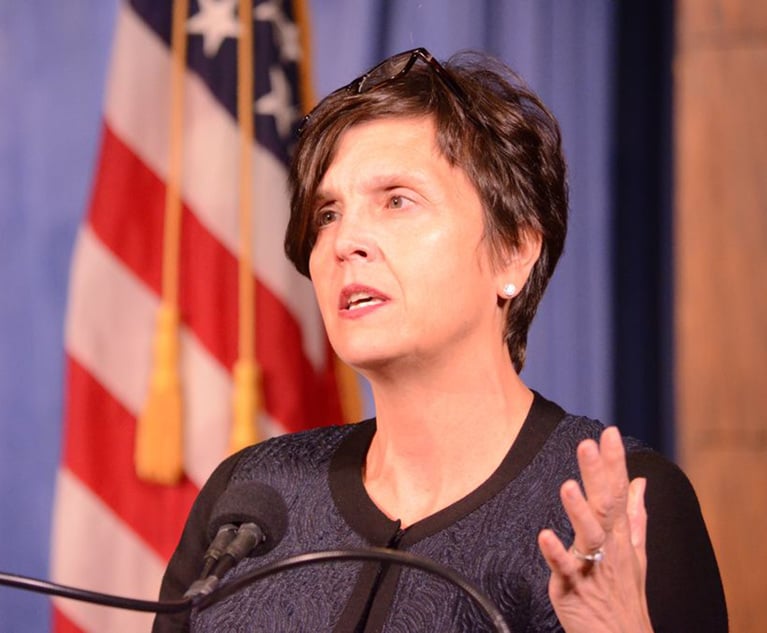Don't 'Short-Circuit' Flynn Proceedings, Judge Emmet Sullivan Tells DC Circuit
"Given the serious allegations in Mr. Flynn's most recent sworn statement, further proceedings in the district court will ensure the integrity of the judicial process and serve the public interest," lawyers from Wilkinson Walsh, representing U.S. District Judge Emmet Sullivan, told the D.C. Circuit on Monday.
June 01, 2020 at 04:15 PM
7 minute read
 U.S. District Judge Emmet Sullivan of the District of Columbia. Photo: Diego M. Radzinschi/ALM
U.S. District Judge Emmet Sullivan of the District of Columbia. Photo: Diego M. Radzinschi/ALM
Updated at 5:58 p.m.
The Washington federal judge presiding over the Michael Flynn case Monday defended his refusal to quickly dismiss the allegation that the onetime Trump national security adviser lied to the FBI, asserting the court has authority to review the Justice Department's recent decision to drop the prosecution.
In a 36-page brief, U.S. District Judge Emmet Sullivan of the District of Columbia urged a federal appeals court in Washington to reject Flynn's bid to bring an end to the case, more than two years after the retired Army general pleaded guilty to lying to investigators about his communications with the Russian ambassador to the United States.
Flynn had asked the U.S. Court of Appeals for the D.C. Circuit to order his case dismissed after Sullivan appointed an outside lawyer to make arguments against the Justice Department's move to drop the case. The judge's decision to appoint an outside lawyer set a stage for additional proceedings over the extraordinary abandonment of the prosecution, one of the first that arose from the special counsel's Russia investigation.
"The question before this court is whether it should short-circuit this process, forbid even a limited inquiry into the government's motion, and order that motion granted. The answer is no," Sullivan's lawyer, Beth Wilkinson of Wilkinson Walsh, wrote in Monday's filing. Wilkinson appeared with Wilkinson Walsh partners Kosta Stojilkovic and Rakesh Kilaru.
Wilkinson added: "The government's motion is pending before Judge Sullivan and could well be granted," she wrote, "so Mr. Flynn can obtain the exact relief he seeks through ordinary judicial process."
The Justice Department based its bid to drop the prosecution on its newfound belief that the FBI lacked a valid reason for questioning Flynn in the fateful January 2017 interview in which he would later admit to lying to investigators.
In a brief filed Monday, the Justice Department said it had also grown concerned that it would not be able to prove that Flynn deliberately lied.
"Simply put, the district court has no authority to reject the executive's conclusion that those reasons justify a dismissal of the charges," the Justice Department argued, in a brief signed by Solicitor General Noel Francisco and Assistant Attorney General Brian Benczkowski, among other Trump appointees.
Invoking the executive branch's power to decide "when—and when not—to prosecute potential crimes," the Justice Department urged the D.C. Circuit to order the case's dismissal.
"Despite that exercise of prosecutorial discretion, and the lack of any remaining Article III controversy between the parties, the district court failed to grant the motion and bring the case to a close. It instead appointed an amicus curiae to argue against dismissal and to consider additional criminal charges," the Justice Department leaders said.
Sullivan argued that he was acting within the bounds of his authority in appointing a former federal judge, John Gleeson, to oppose the Justice Department's motion to dismiss and address whether the court should consider holding Flynn in contempt. Sullivan has also invited other outside voices to file amicus—or "friend of the court"—briefs ahead of a July court argument concerning the Justice Department's move to drop the case.
"Someone needs to fill the adversarial gap to ensure full consideration of the issues, and a former prosecutor and federal judge is well positioned to do so," Wilkinson wrote in Monday's filing.
Sullivan's lawyers pointed to instances where courts have appointed outside lawyers to argue positions abandoned by the Justice Department. In one recent case, the judge's brief noted, an outside lawyer was picked by a federal appeals court to make arguments the Trump Justice Department walked away from in the prosecution of former Arizona Sheriff Joseph Arpaio.
The recent developments in Flynn's case have raised novel questions about the role judges play in reviewing prosecutorial steps, including decisions to drop cases altogether. With Flynn, those questions have emerged against the backdrop of prosecution with little obvious precedent, involving an ally of the president's who tried to retract his guilty plea after admitting—twice—to criminal misconduct, only to later have the Justice Department move to drop the case.
Sullivan's brief came on the heels of others in which prominent lawyers, Republican state attorneys general and former judges debated the scope of the court's authority. On May 29, a group of two dozen former federal judges argued that Sullivan has full authority to review the Justice Department's abandonment of the Flynn case, declaring that judges are not "mere scriveners of whatever dismissal the government places before them."
The former federal judges also questioned whether the Justice Department acted in "bad faith" and argued that Sullivan has more than a mere "ministerial role" in considering the government's move to drop the case.
In a brief filed earlier last month, a group of 16 Republican state attorneys general told the D.C. Circuit that Sullivan had overstepped his authority in appointing Gleeson to oppose the Justice Department.
"Courts may not order the commencement of any prosecution, and they may not order the continuation of what they cannot initiate. The district court, in other words, has no power to do what it is doing," the attorneys general wrote.
Sullivan argued he has not prejudged the Justice Department's move to dismiss the Flynn case.
 Beth Wilkinson of Wilkinson Walsh.
Beth Wilkinson of Wilkinson Walsh."Judge Sullivan has not disparaged DOJ's integrity in any way. And although the government has attacked the investigation of Mr. Flynn, it has not asserted any misconduct by the career prosecutors who previously oversaw the case," Wilkinson wrote. "In any event, given the serious allegations in Mr. Flynn's most recent sworn statement, further proceedings in the district court will ensure the integrity of the judicial process and serve the public interest."
In defense of his appointment of Gleeson, Sullivan pointed to his review of a 2014 settlement between the Justice Department and Saena Tech Corp., resolving claims that the small South Korean firms paid bribes for Army contracts. Before approving the deferred prosecution agreement, Sullivan appointed an outside lawyer to address his authority to review—and possibly reject—the settlement terms.
With the Justice Department and Flynn now aligned on the case's dismissal, Sullivan cited the Saena case to argue it was again necessary to appoint an amicus counsel to "fill the void created by this breakdown in the adversarial process."
"In such circumstances, appellate courts often appoint an amicus to ensure sound decisionmaking," Wilkinson wrote. "There is no principled reason to preclude district courts—which also exercise Article III power—from doing the same."
Read more:
No 'Rubber Stamps': Emmet Sullivan Has Long Defended Power of Federal Judges
24 Former Federal Judges Support Emmet Sullivan in Flynn's DC Circuit Challenge
Flynn Judge Emmet Sullivan Hires Veteran Trial Lawyer Beth Wilkinson
Barr's Move to Drop Flynn Case Puts Spotlight on 1977 US Supreme Court Ruling
This post was updated to include the Justice Department's brief, filed Monday evening.
This content has been archived. It is available through our partners, LexisNexis® and Bloomberg Law.
To view this content, please continue to their sites.
Not a Lexis Subscriber?
Subscribe Now
Not a Bloomberg Law Subscriber?
Subscribe Now
NOT FOR REPRINT
© 2025 ALM Global, LLC, All Rights Reserved. Request academic re-use from www.copyright.com. All other uses, submit a request to [email protected]. For more information visit Asset & Logo Licensing.
You Might Like
View All
Skadden and Steptoe, Defending Amex GBT, Blasts Biden DOJ's Antitrust Lawsuit Over Merger Proposal
4 minute read
'Lack of Independence' or 'Tethered to the Law'? Witnesses Speak on Bondi
4 minute read
Trending Stories
- 1Silk Road Founder Ross Ulbricht Has New York Sentence Pardoned by Trump
- 2Settlement Allows Spouses of U.S. Citizens to Reopen Removal Proceedings
- 3CFPB Resolves Flurry of Enforcement Actions in Biden's Final Week
- 4Judge Orders SoCal Edison to Preserve Evidence Relating to Los Angeles Wildfires
- 5Legal Community Luminaries Honored at New York State Bar Association’s Annual Meeting
Who Got The Work
J. Brugh Lower of Gibbons has entered an appearance for industrial equipment supplier Devco Corporation in a pending trademark infringement lawsuit. The suit, accusing the defendant of selling knock-off Graco products, was filed Dec. 18 in New Jersey District Court by Rivkin Radler on behalf of Graco Inc. and Graco Minnesota. The case, assigned to U.S. District Judge Zahid N. Quraishi, is 3:24-cv-11294, Graco Inc. et al v. Devco Corporation.
Who Got The Work
Rebecca Maller-Stein and Kent A. Yalowitz of Arnold & Porter Kaye Scholer have entered their appearances for Hanaco Venture Capital and its executives, Lior Prosor and David Frankel, in a pending securities lawsuit. The action, filed on Dec. 24 in New York Southern District Court by Zell, Aron & Co. on behalf of Goldeneye Advisors, accuses the defendants of negligently and fraudulently managing the plaintiff's $1 million investment. The case, assigned to U.S. District Judge Vernon S. Broderick, is 1:24-cv-09918, Goldeneye Advisors, LLC v. Hanaco Venture Capital, Ltd. et al.
Who Got The Work
Attorneys from A&O Shearman has stepped in as defense counsel for Toronto-Dominion Bank and other defendants in a pending securities class action. The suit, filed Dec. 11 in New York Southern District Court by Bleichmar Fonti & Auld, accuses the defendants of concealing the bank's 'pervasive' deficiencies in regards to its compliance with the Bank Secrecy Act and the quality of its anti-money laundering controls. The case, assigned to U.S. District Judge Arun Subramanian, is 1:24-cv-09445, Gonzalez v. The Toronto-Dominion Bank et al.
Who Got The Work
Crown Castle International, a Pennsylvania company providing shared communications infrastructure, has turned to Luke D. Wolf of Gordon Rees Scully Mansukhani to fend off a pending breach-of-contract lawsuit. The court action, filed Nov. 25 in Michigan Eastern District Court by Hooper Hathaway PC on behalf of The Town Residences LLC, accuses Crown Castle of failing to transfer approximately $30,000 in utility payments from T-Mobile in breach of a roof-top lease and assignment agreement. The case, assigned to U.S. District Judge Susan K. Declercq, is 2:24-cv-13131, The Town Residences LLC v. T-Mobile US, Inc. et al.
Who Got The Work
Wilfred P. Coronato and Daniel M. Schwartz of McCarter & English have stepped in as defense counsel to Electrolux Home Products Inc. in a pending product liability lawsuit. The court action, filed Nov. 26 in New York Eastern District Court by Poulos Lopiccolo PC and Nagel Rice LLP on behalf of David Stern, alleges that the defendant's refrigerators’ drawers and shelving repeatedly break and fall apart within months after purchase. The case, assigned to U.S. District Judge Joan M. Azrack, is 2:24-cv-08204, Stern v. Electrolux Home Products, Inc.
Featured Firms
Law Offices of Gary Martin Hays & Associates, P.C.
(470) 294-1674
Law Offices of Mark E. Salomone
(857) 444-6468
Smith & Hassler
(713) 739-1250











